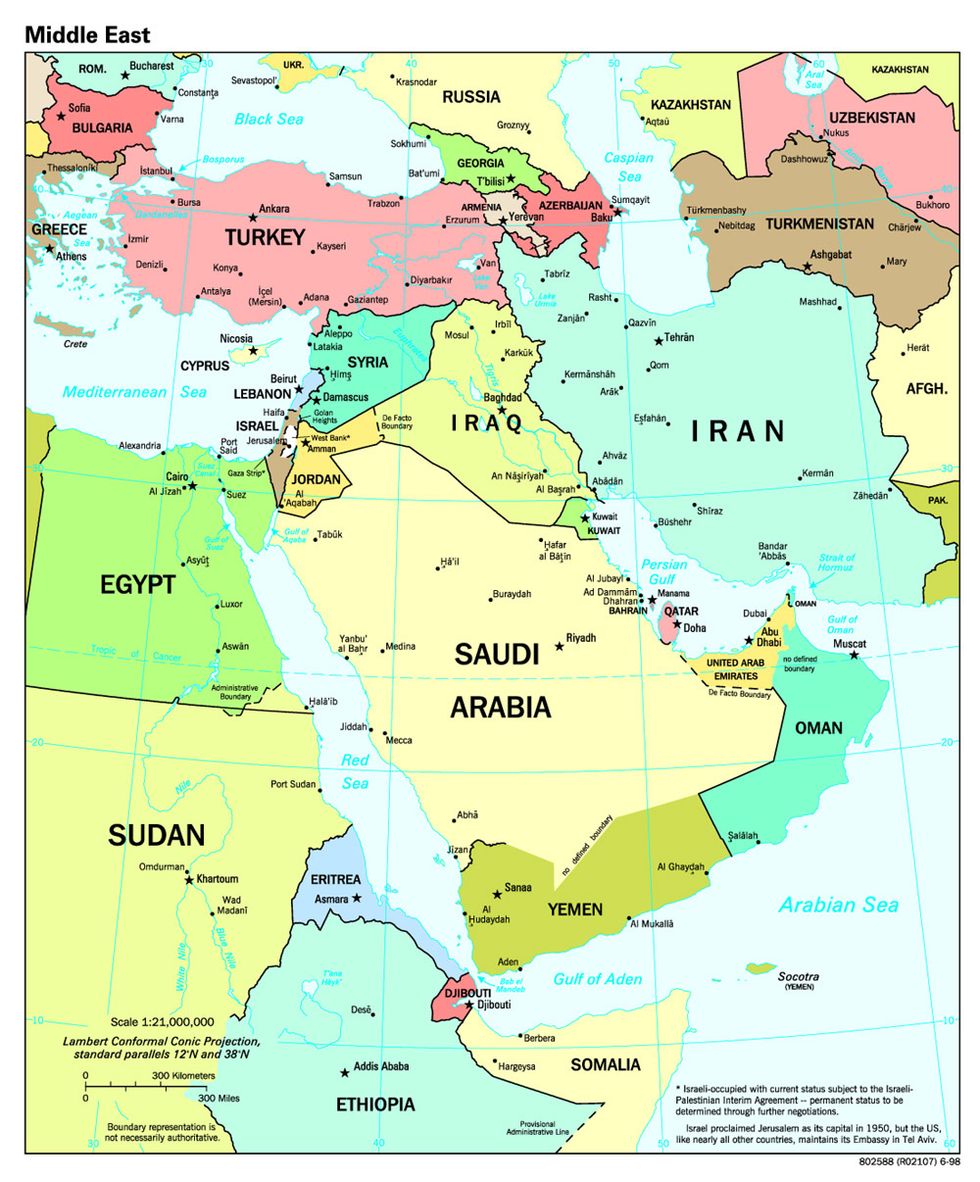The 2018 World Cup is running quite smoothly in Russia, as VAR (Video Assistant Referee) technology has been a wonderful breakthrough in fair play, and we've also seen our fair share of shocks, such as reigning champions Germany being eliminiated in the group stage after losing 2-0 to South Korea.
The next World Cup is set to be hosted in Qatar, a tiny but incredibly wealthy Middle Eastern kingdom on the Arabian Peninsula. It is home to just over 2 million people, far smaller than the last two hosts, Russia and Brazil. Qatar is not a soccer powerhouse by any means. How did it get the rights to host the world's biggest sporting event? You'll soon know how, and why this country is not suitable for the 2022 World Cup.
Note: If I don't list a source for some facts, it comes directly from the research done for my International Politics term paper on FIFA corruption. You can read it here.
1. High summer temperatures...
The World Cup always take place in the summer months, June and July. However, this poses a slight problem for Qatar. The average high temperature in the summer in Qatar is around 108° F, and it's not unusual for it to reach 122°. Players and fans could face issues like heat stroke, hypothermia and severe sunburns if exposed to the heat for too long.
2. ...which leads to a tournament during the winter months.

The English Premier League trophy.
This isn't a problem, right? Wrong. Most European and South American leagues, as well as continental competitions like the UEFA Champions League, have schedules that run from August to May, and their winter breaks are relatively short, if they have them at all. Qatar 2022 is going to take place from November 21 to December 18. This will leave top teams like Real Madrid, Manchester United, Barcelona and Bayern Munich without some of their top players, who will be out on international duty.
3. Treatment of women and LGBT people

LGBT Pride.
Like current host Russia, Qatar also faces an issue with discrimination. Homosexuality is illegal, and punishments are much greater than in Western countries or even Russia. This poses a question of whether LGBT fans will be targeted in the Muslim-majority nation. Similar to other Middle Eastern nations like Saudi Arabia, Iran and Kuwait, women are often seen as second-class citizens and do not enjoy many of the freedoms women in the West have. Female fans coming to the World Cup could be subject to discrimination and will have to follow the country's laws that are strictly based on Sharia (Islamic) law.
4. A no-alcohol policy
What’s a soccer game without a beer in your hand? Drinking is a big part of soccer culture, especially in European countries like England and Germany. Qatar, being a country that basis its laws on the Qur’an, has a strict no-alcohol policy. This is definitely a disadvantage to Qatar, as the policy could draw away many spectators. It would also lead to Qatar and FIFA losing out on tons of revenue.
5. Horrible conditions for stadium workers

A political cartoon depicting the treatment of stadium workers in Qatar.
According to a Human Rights Watch report, the majority of migrant workers in Qatar are underpaid, earning between $8-11 per day. In addition, the Qatar Human Rights Committee found that 33.9 percent of workers surveyed were not paid regularly. Amnesty International also found that these workers, the majority from South Asian countries such as Nepal, India and Bangladesh, are forced to live in cramped and dirty housing. Some are not even permitted to leave their worksite or worker's camp. They may have to pay recruitment fees of up to $4,300 to escape poverty back home and work in Qatar; however, they typically cannot leave the country, since their employers confiscate their passports or refuse exit permits. To date, according to Qatar's government, there have been at least 964 deaths of migrant workers from these countries. Don't support modern slave labor.
6. Qatar’s in a volatile region

A map of the Middle East.
Qatar's neighbors, Saudi Arabia and Bahrain, have broke off their relations with the small country and blockaded the borders, following accusations that Qatar is a major funder of terrorist groups, such as al-Qaeda and the Islamic State. Saudi Arabia, the United Arab Emirates and Bahrain have closed off their land routes and seaports, and refuse to let Qatar use their airspace. The border with Saudi Arabia is the only land route, Qatar relies on seaports for its materials for infrastructure, and the airspace blockade is a huge inconvenience for Qatar Airways, their national airline. The risk of terrorism is especially high in these areas, especially since Qatar has been accused of helping these groups.
7. Qatar has no soccer history and is not a sporting powerhouse.
When you think of countries known for soccer, which ones come to mind? Five-time World Cup champions Brazil? Spain, home to Real Madrid and Barcelona? England, who invented the sport? Germany? Argentina? Mexico? Even the USA? Many people don't know that Qatar is even a country! Qatar has never qualified for a World Cup before, and it’s only involved in the sport due to its extreme wealth. Qatar Airways was a shirt sponsor for FC Barcelona, and wealthy Qatari businessmen who became rich from oil own some big teams such as Manchester City and Paris Saint-Germain.
8. It’s very expensive to travel to.

Qatar is a very distant country from most parts of the world, especially the Americas, Western Europe and Australia. A round-trip ticket from New York to Doha in November goes for anywhere from $700 to around $1,500, according to Google Flights (there's even a first class ticket going for $26,000!). From London, it's $450-1,000, for Sydney it's no cheaper than $1,000 and from Rio de Janeiro it's anywhere between $1,300 and $4,000. You'll be broke before you even arrive in Qatar. Not to mention that like in Dubai, things like souvenirs and quality meals will cost you quite a bit as well. And your World Cup tickets, too. They have to make up for the eye-watering $200 billion they plan to spend on infrastructure.
9. Qatar bought the World Cup with corruption

Former FIFA president Sepp Blatter.
Qatari businessman and former Asian football president Mohammed bin Hammam withdrew his FIFA president candidacy after allegedly handing out $1 million in unmarked envelopes filled with $40,000 in cash each. These envelopes were used to bribe soccer officials so that they would vote for Qatar's 2022 World Cup bid, which they won. Other contenders for 2022 included Australia, the United States, Japan and South Korea, who all appear to be much more qualified to host and have more soccer history than Qatar.
- FIFA Think Again | FIFA, Think Again. No World Cup 2022 in Qatar ›
- 6 Reasons Why the World Cup Should Be Taken Away from Qatar ... ›
- U.S. Should Host 2022 World Cup, Not Qatar | HuffPost ›
- Should Qatar be allowed to host the 2022 FIFA World Cup? - Quora ›
- Qatar shouldn't host 2022 World Cup - The Boston Globe ›
- 11 Reasons Why The Qatar World Cup Will Be A Disaster - Business ... ›
- Stanley: Qatar shouldn't host 2022 World Cup | App Content ... ›



















